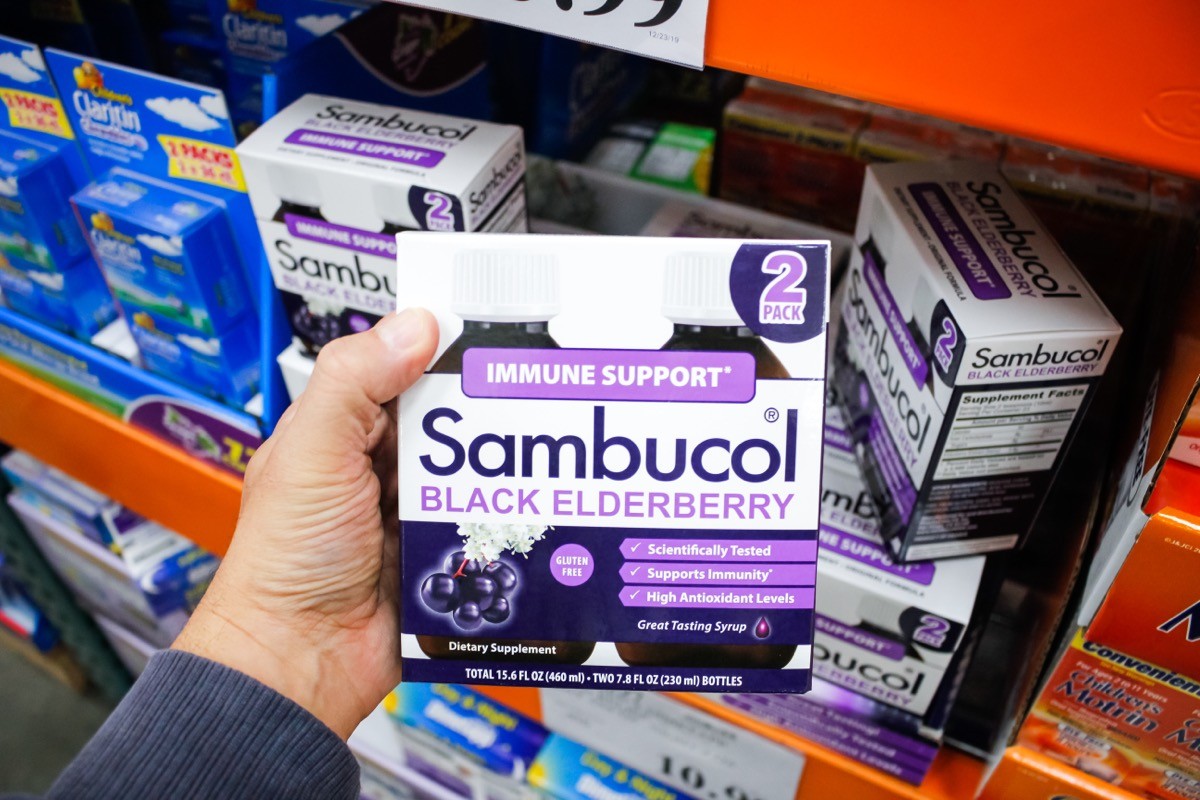Doctor Shares Amazing Health Benefits of Elderberry

If you’ve spent much time on TikTok lately, you may have noticed a new wellness trend: Instructional videos explaining how to make elderberry syrups, gummies, and juices, along with a heated debate over the elderberry plant’s effectiveness in boosting certain facets of your health. This, of course, has us wondering about the validity of these purported elderberry benefits.
“Elderberry plant (Sambucus nigra) is a good source of protein, free and conjugated forms of amino acids, unsaturated fatty acids, fiber fractions, vitamins, antioxidants and minerals,” says a 2015 study published in the Journal of Functional Foods. The study says that its antioxidant content—especially its high level of polyphenols—makes it useful in the treatment of many diseases and ailments.
But what exactly do you stand to gain by taking elderberry supplements—and is it as effective as some claim? Read on to hear a doctor’s thoughts.
RELATED: 7 St. John’s Wort Benefits You Probably Didn’t Know, Doctors Say.
Elderberry can boost your immune system.
Elderberry may help shorten and ease symptoms of the common cold.
“Elderberries are believed to have antiviral properties,” says Insiyah Amiji, MD, a pediatrician and medical advisor at Baby Toddler Kids. “While it’s not a cure-all, it might help your body fight off certain viruses more effectively.'”
”Elderberry supplements have become such a popular go-to for boosting immunity, especially during cold and flu season, and for good reason. They’re packed with antioxidants and vitamin C, which are key players in supporting the immune system. There’s also some research suggesting that elderberry may help reduce the severity and duration of cold symptoms, which is always a win when you’re battling sniffles and coughs.”
In particular, a 2016 study published in the journal Nutrients found that elderberries can help protect your immune system when traveling by air, where you’re at high risk for viral transmission.
In a double-blind, placebo-controlled clinical trial of 312 economy class passengers traveling internationally, the team assessed how elderberry affected overall physical health, mental health, and respiratory health. Using diaries and questionnaires to track the participants’ symptoms, the team found that among those who reported cold symptoms, those in the placebo group had a significantly longer duration of cold episode days. The researchers add that the average symptom score over these days was also significantly higher.
Elderberry has anti-inflammatory properties.
Amiji cites the supplement’s anti-inflammatory properties, noting that these may help ease minor aches or discomfort that often come with colds or other mild illnesses.
Elderberry can also help reduce oxidative stress and prevent cellular damage caused by free radicals. According to Cleveland Clinic, this can, in turn, help prevent a wide range of serious chronic health conditions, including cancer, Alzheimer’s disease, heart disease, kidney disease, and more.
The Journal of Functional Foods study adds that elderberry’s polyphenol content can also improve blood pressure and help stabilize blood sugar.
RELATED: 8 Health Benefits of Drinking Cranberry Juice, According to Doctors.
As with any supplement, safety is key.
Amiji emphasizes that elderberry is not a miracle supplement—nor is it a replacement for proven disease prevention measures like vaccines or taking medications as needed: “I’d say it’s a nice addition to your toolkit, like washing your hands and getting enough sleep.”
The pediatrician adds that it’s important to consider the safety risks when taking elderberry supplements. “Stick to reputable brands and follow the dosage instructions, as too much can lead to upset stomachs or, in rare cases, more serious issues due to unripe berries or improperly processed products,” she advises.
Some people shouldn’t take elderberry supplements.
While elderberry is generally safe for most people when taken as directed, there’s still a chance of allergic reactions or interactions with certain medications. For instance, if a patient also takes immune-suppressing drugs, elderberry’s immune-boosting properties could undermine their effectiveness, Amiji points out.
‘”It’s also worth noting that supplements aren’t regulated as strictly as medications, so quality matters,” Amiji says. “Look for third-party testing or certifications to make sure what you’re taking is free of contaminants and contains what it claims to.”
And keep in mind that elderberry supplements are not a proven treatment for COVID-19. The National Center for Complementary and Integrative Health states, “There is insufficient evidence to know if it can help with symptoms.”
RELATED: 12 Supplements You Should Never Take Together, Medical Experts Say.
The takeaway.

Amiji says that elderberry can be a “fantastic support tool” but also stresses that it’s just one piece of the puzzle in staying healthy: “It works best when paired with good nutrition, hydration, and healthy habits like regular exercise and proper sleep.”
‘”Would I recommend it? Sure, as part of a balanced approach to health, but always with a little caution and the understanding that it’s not a substitute for medical care when you’re sick,” she tells Best Life.
Vulnerable individuals, including children, pregnant women, seniors, and those with underlying health conditions, should take extra precautions. However, “it’s always a good idea to check with a doctor first before adding elderberry to the mix,” Amiji adds.